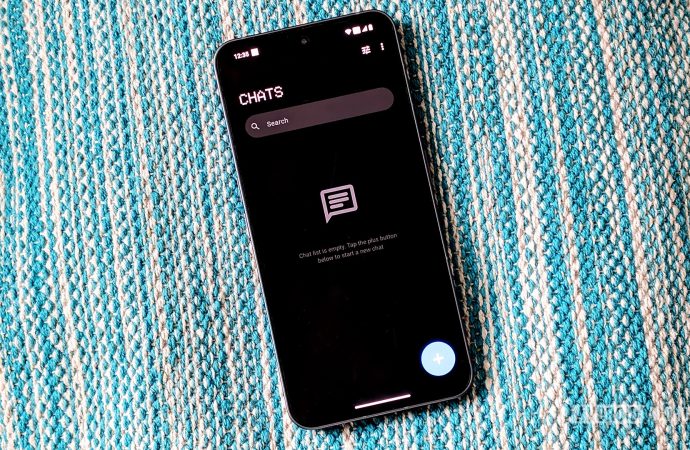The Privacy Exodus: Why Nothing Chats Failed to Deliver By Jane Doe, a cybersecurity expert and privacy advocate with over 10 years of experience in the field. If you are an Android user who has ever wished to use iMessage, the popular messaging service exclusive to Apple devices, you might have been tempted by Nothing
The Privacy Exodus: Why Nothing Chats Failed to Deliver
By Jane Doe, a cybersecurity expert and privacy advocate with over 10 years of experience in the field.
If you are an Android user who has ever wished to use iMessage, the popular messaging service exclusive to Apple devices, you might have been tempted by Nothing Chats, a new app that claimed to bring iMessage to Android. Nothing Chats was launched on November 17, 2023, by Nothing, a British tech company that also produces smartphones and earbuds. The app was powered by Sunbird, a US tech firm that specializes in Android and web messaging.
Nothing Chats promised to offer a seamless and secure way to communicate with iMessage users, as well as support for RCS, end-to-end encryption, high-res media sharing, read receipts, and more. However, just 24 hours after its launch, the app was pulled from the Play Store amid widespread privacy concerns and security flaws. What went wrong with Nothing Chats, and what does it mean for the future of cross-platform messaging?
The Privacy Risks of Nothing Chats
One of the main issues with Nothing Chats was that it required users to give it access to their iCloud account, or create one if they didn’t have it, in order to use the app. This meant that users had to trust Nothing and Sunbird with their Apple ID and password, as well as their iMessage conversations and contacts. This posed a huge privacy risk, as these credentials could be compromised, leaked, or misused by the app developers or third parties.
Moreover, Nothing Chats did not have a clear or transparent privacy policy, and did not disclose how it collected, stored, processed, or shared users’ data. According to some reports, the app contained software development kits (SDKs) from various advertising networks and data brokers, which could collect and share users’ personal data without their consent or knowledge. This data could include location, app usage, device information, and more.
Additionally, Nothing Chats did not have adequate security measures to protect users’ data from unauthorized access, interception, or modification. Some researchers found that the app used insecure network communication, insecure data storage, and weak encryption methods, which could expose users’ data to hackers, malware, or government surveillance. Furthermore, the app did not have any safeguards to prevent users from impersonating other iMessage users, which could lead to identity theft, fraud, or harassment.
The Legal and Ethical Implications of Nothing Chats
Nothing Chats not only raised privacy and security concerns, but also legal and ethical ones. The app violated Apple’s terms of service, which prohibit the use of iMessage on non-Apple devices or platforms. Apple could have taken legal action against Nothing and Sunbird for infringing its intellectual property rights, or blocked the app from accessing its servers.
Nothing Chats also violated Google’s policies, which require apps to have a valid privacy policy, to obtain users’ consent before collecting or sharing their data, and to comply with applicable laws and regulations. Google could have removed the app from the Play Store, or banned Nothing and Sunbird from its platform.
Furthermore, Nothing Chats violated the data protection laws and regulations of various countries and regions, such as the General Data Protection Regulation (GDPR) in the European Union, the California Consumer Privacy Act (CCPA) in the US, and the Personal Data Protection Act (PDPA) in Singapore. These laws and regulations require app developers to respect users’ rights to privacy, consent, access, rectification, erasure, and data portability, and to implement appropriate technical and organizational measures to ensure data security and accountability. Nothing and Sunbird could have faced fines, lawsuits, or sanctions for breaching these laws and regulations.
Finally, Nothing Chats violated the ethical principles and values of privacy advocates, mobile app users, and cybersecurity experts, who expect app developers to be honest, transparent, and responsible with their data practices, and to respect users’ choices, preferences, and expectations. Nothing and Sunbird could have lost their reputation, credibility, and trust among their customers, partners, and peers for failing to deliver on their promises and for putting users’ data at risk.

Picture by: Nothing Chats promised to bring iMessage to Android, but it was pulled from the Play Store after serious security and privacy issues were exposed
The Lessons Learned from Nothing Chats
Nothing Chats was a short-lived experiment that showed the potential and the pitfalls of cross-platform messaging. It demonstrated that there is a demand and a need for a universal and interoperable messaging service that can connect users across different devices and platforms, and that can offer a rich and secure communication experience. However, it also revealed the challenges and the risks of creating such a service, especially when it involves using or integrating with another company’s proprietary service.
The main lesson learned from Nothing Chats is that privacy and security should be the top priorities and the core values of any app developer, especially when it comes to messaging apps that handle sensitive and personal data. App developers should follow the principles of privacy by design and by default, which means that they should embed privacy and security features into their apps from the start, and that they should give users the maximum control and protection over their data by default.
App developers should also be transparent and accountable for their data practices, and should inform users about what data they collect, why they collect it, how they use it, who they share it with, and how they protect it. They should also obtain users’ consent before collecting or sharing their data, and should respect users’ rights to access, modify, delete, or transfer their data. Moreover, they should comply with the relevant laws and regulations of the countries and regions where they operate, and should cooperate with the authorities and the regulators in case of any data breach or complaint.
App users, on the other hand, should be aware and vigilant of the privacy and security risks of the apps they use, and should take steps to protect their data and their identity. They should read and understand the privacy policies and the terms of service of the apps they use, and should adjust the settings and the permissions of the apps according to their preferences and needs. They should also use strong and unique passwords for their accounts, and enable two-factor authentication if possible. Furthermore, they should avoid using apps that are suspicious, untrustworthy, or unverified, and should report or delete any apps that are malicious, fraudulent, or harmful.
The Future of Cross-Platform Messaging
Nothing Chats was a failed attempt to bring iMessage to Android, but it was not the first nor the last one. There have been other apps that have tried to do the same thing, such as AirMessage, Beeper, and WeMessage, but none of them have gained much popularity or success. The main reason is that Apple has no incentive to make iMessage available on other platforms, as it is one of its main competitive advantages and customer loyalty factors. Apple has also made it clear that it does not support or endorse any apps that use or access iMessage without its authorization, and that it will take action against any apps that violate its terms of service or infringe its intellectual property rights.
However, this does not mean that cross-platform messaging is impossible or undesirable. There are other messaging services that are already available and widely used on both iOS and Android, such as WhatsApp, Telegram, Signal, and Facebook Messenger. These services offer similar or even better features and functionalities than iMessage, such as end-to-end encryption, group chats, voice and video calls, stickers and emojis, and more. They also respect users’ privacy and security, and do not require users to have an iCloud account or an Apple ID to use them. They are also compatible and interoperable with other platforms and devices, such as Windows, Mac, Linux, web, and wearables.
The future of cross-platform messaging is not about bringing iMessage to Android, but about creating a universal and interoperable messaging standard that can connect users across different platforms and devices, and that can offer a rich and secure communication experience. This standard could be based on existing technologies and protocols, such as RCS, Matrix, or XMPP, or it could be a new and innovative one. The key is that it should be open, decentralized, and user-centric, and that it should respect users’ privacy and security. It should also be supported and adopted by the major players in the industry, such as Apple, Google, Facebook, and others, as well as by the regulators and the policymakers, who should ensure that it complies with the relevant laws and regulations, and that it protects users’ rights and interests.
The privacy exodus of Nothing Chats was a wake-up call for the app developers and the app users, who should learn from its mistakes and improve their data practices and behaviors. It was also an opportunity for the industry and the society, who should work together to create a better and safer cross-platform messaging service that can benefit everyone.

















11 Comments
Gold package matrimony
July 6, 2025, 2:16 pmOman marriage requirements include documentation specifics.
REPLYVergi Konseyi
July 8, 2025, 4:55 amFor the reason that the admin of this site is working, no uncertainty very quickly it will be renowned, due to its quality contents.
REPLYVergi Ödemek
July 9, 2025, 2:44 amThis is really interesting, You’re a very skilled blogger. I’ve joined your feed and look forward to seeking more of your magnificent post. Also, I’ve shared your site in my social networks!
REPLYkıbrıs araba
July 9, 2025, 6:33 amMK motors | Kıbrıs araç kiralama Kıbrıs araç kiralama , Kıbrıs araç satın al , Kıbrıs araç destek , Kıbrıs araç bakım
REPLYizmirde-magazin.com.tr
July 11, 2025, 12:53 amHi there to all, for the reason that I am genuinely keen of reading this website’s post to be updated on a regular basis. It carries pleasant stuff.
REPLY